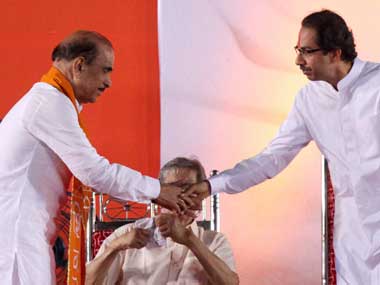At age 76, Shiv Sena’s senior leader Manohar Joshi has enjoyed the fruits of Sena’s power more than any other functionary in the party. As a trusted lieutenant of the Sena’s founder, the late Bal Thackeray, he was richly rewarded at every stage of the Sena’s elevation in politics right through the early 1970s. Joshi was one of Shiv Sena’s earliest mayors of Bombay (1976-77) and Maharashtra’s first non-Congress chief minister when the Sena, with its alliance partner, the BJP rode to power in Maharashtra in 1995. Even after he was forced to step down as chief minister in 1999 in the wake of court strictures against him for favouring his builder son-in-law in the Sun Dew apartments scam in Pune, Joshi occupied ministerial berths in Delhi and had also graced the Speaker’s chair in the Lok Sabha. He saw that as an opportunity to go even higher, as a vice-presidential nominee. [caption id=“attachment_1171095” align=“alignleft” width=“380”]  Manohar Joshi during the Shiv Sena rally on Sunday. PTI[/caption] All that stood reduced to dust with the ignominious manner in which Joshi was booed off the stage by common Shiv Sainiks at the party’s most-important annual gathering, the Dussehra rally at Mumbai’s Shivaji Park grounds on 13 October. Humiliated off the stage, Joshi left the venue promptly. When accosted by journalists for a reaction, the former Maharashtra chief minister was ashen-faced but guarded in his comments. “Whatever has happened is the result of a misunderstanding,” was how he put it without wanting to be dragged further into the controversy. As with the Sun Dew apartments case, when he brought misery upon himself by manipulating the public reservation status of a municipal school in Pune to favour his builder son-in-law, in the present situation too, Joshi invited the crisis upon himself. The trouble began last month when Joshi met the party president Uddhav Thackeray to stake claim to the Mumbai south-central Lok Sabha seat from where he had won in 1999, but lost in 2004. Amidst clear indications that the party was favouring a younger aspirant for that seat (Rahul Shewale, standing committee chairman of the Brihanmumbai Municipal Corporation), Joshi sought clarifications from Uddhav. After the meeting he told reporters that he was even willing to contest from Thane or Kalyan as an alternative to his home constituency. Ever the diplomat who always described his meetings with Uddhav as “cordial”, Joshi sparked another controversy when he obliquely criticised Uddhav during a public speech in Mumbai last week, for not being aggressive enough in demanding a memorial for Bal Thackeray at Shivaji Park, Dadar. Had the late Bal Thackeray faced such an issue over a memorial for his father, said Joshi, he would have brought the government down. Joshi precipitated matters further by openly confabulating with NCP president Sharad Pawar, suggesting that he was exploring options other than the Shiv Sena. It was now only natural that this heavyweight of the past would be seen as weakening the party and attract the ire of the Sena rank and file on the ground. Thus, little time was lost in booing him off the stage at Shivaji Park. If the BJP could silence a stalwart like LK Advani for coming in the way of Narendra Modi’s elevation as the party’s prime ministerial candidate, certainly, Manohar Joshi couldn’t have expected any less. Joshi’s biggest folly was his eagerness to perpetuate his political relevance in the Shiv Sena by demanding the assurance of a parliamentary seat. This bid for personal power was all the more ill-timed because of the challenging times in which the Shiv Sena finds itself. One year after Bal Thackeray’s death, Uddhav has been trying hard to consolidate his position in the party, hold the flock together and effectively face the challenge of the 2014 state and general elections that will serve as a test of his leadership. Uddhav is blessed with neither the aggressive posturing nor the oratorical skills of his father or cousin Raj Thackeray. Bereft of its own, distinctive agenda for the 2014 polls, the Shiv Sena is hopeful that Narendra Modi will rescue the party in the general elections and an anti-incumbency wave will help their cause in the state polls that are also slated for next year. Rather than pushing for a ticket for himself- after having enjoyed all the top positions in previous decades- Manohar Joshi should have applied his age and experience to strengthen Uddhav’s hand and the future of the Sena. An avuncular role in guiding the party and the younger generation of the Sena was expected of him, not a narrow, self-seeking agenda. In the eyes of the Sena rank and file, Joshi exposed himself as a small-minded, self-seeking politician who did not value all the rewards that the party bestowed on him and inevitably, little time was lost in putting him in place. Manohar Gajanan Joshi’s political journey has all but lost its direction.
Joshi’s biggest folly was his eagerness to perpetuate his political relevance in the Shiv Sena by demanding the assurance of a parliamentary seat
Advertisement
End of Article


)
)
)
)
)
)
)
)
)



